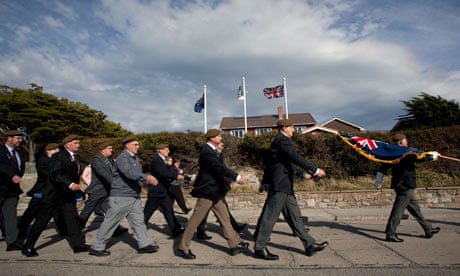The claim, often repeated in the media and by veterans' groups, that more Falklands vets had killed themselves than died fighting in the actual conflict, has been roundly rejected by a study especially commissioned by the Ministry of Defence.
For years there have been reports that the suicide toll of Falklands vets exceeded the 255 who were killed in action during the conflict thirty years ago.
The MoD statistical study, released on Tuesday, concludes that the risk of dying as a result of suicide for the Falklands vets was no different from the general population of the UK.
Vets were actually 36% less likely to die than the general population over the same period of time, it says.
The MoD investigated the circumstances of 21,432 Falklands veterans. It found that as of 31 December 2012, some 1,335 had died.
That figure compares with an estimated 2,079 deaths that would have been expected among veterans if they had experienced the same mortality rate as the UK population as a whole.
Of the Falklands veterans, 7% — 95 deaths — were due to "intentional self-harm and events of undetermined intent (suicides and open verdict deaths)", says the MoD study.
"For each year over the entire period [between 1982 and 2012] the risk of dying as a result of suicide for the Falklands veterans was no different to the UK general population", the study emphasised.
It also found that veterans were 40% less likely to die from disease than the rest of the UK population over the period since 1982.
The MoD points the finger at the Daily Mail and BBC in particular for reporting claims that more Falklands vets had committed suicide than were killed in the war.
Why did those reports seem to strike chords and gain currency?
The short answer is that veterans' groups, including the South Atlantic Medal Association, accused the government, and the MoD in particular, of not doing enough to help vets, for being too slow to acknowledge mental, as opposed to physical, illness.
The MoD still seems to be on the defensive. Responding to the study of Falklands vets it insisted that the mental health of our personnel and veterans were a "top priority".
It added that it had committed £7.2m on mental health support projects, including "tailored" NHS mental health services and a 24-hour helpline with the charity, Combat Stress.
Proper health care for vets now demanded by public opinion — even more so because of the unpopularity of the Iraq and Afghan conflicts when compared to the Falklands — is a growing factor in the legacy of conflict, contributing to its increasing cost.
That is already increasing signficantly because of the cost of protecting troops on the battlefield itself. The cost of equipping a US infantry soldier is estimated to have increased from just $175 in 1944 to up to $10,000 now.
The figures were cited recently by Ben Barry, a retired brigadier and now senior fellow for land warfare at the International Institute for Strategic Studies (IISS). He was speaking on the subject of "Hard fighting, hard times, hard choices: Strategic challenges facing modern armies".
He spoke about a "prevailing gloom" over "the utility of force" after the experiences of Iraq and Afghanistan.
All recent wars had been "amongst the people" and that was likely to continue, he said. He added: "Together with the global megatrend of urbanisation it is likely that most land combat will increasingly take place not just around, but also in villages, towns, and cities. Urban operations will become less exceptional- more the new normal".
As if to counter a growing view that the time of large numbers of western boots on the ground had gone for ever, Barry stressed that "numbers count" in counter insurgency operations.
"Not only having large numbers of security boots on the ground, but also growing, training, and mentoring indigenous forces".
The question is will there be political appetite in western capitals even for these kind of operations, especially given the growing cost of minimising risks and protecting troops and an increasingly wary and sceptical public opinion.

Comments (…)
Sign in or create your Guardian account to join the discussion